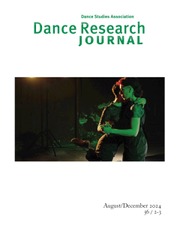Article contents
Inside/Beside Dance Studies: A Conversation: Mellon Dance Studies in/and the Humanities
Published online by Cambridge University Press: 25 March 2014
Abstract
In 2012, Susan Manning, Rebecca Schneider, and Janice Ross collaborated across their home institutions of Northwestern University, Brown University, and Stanford University, respectively, to found a research initiative interrogating the field of dance studies. This manifold project, Dance Studies in/and the Humanities, receives funding from the Andrew W. Mellon Foundation through 2015 and includes a series of public roundtable discussions. This conversation—abridged from the original event—took place during two such roundtables at Brown University in June 2013, and it features substantial contributions from scholars Michelle Clayton, Mark Franko, Nadine George-Graves, André Lepecki, Susan Manning, Janice Ross, and Rebecca Schneider. Speakers address what dance studies may need, want, or do in this current historical moment. Manning articulates her experience being “inside” and “beside” dance studies through teaching in an integrationist/assimilationist model that promotes dance as a subfield in humanities (and occasionally social science) departments. Franko asserts that dance studies formed as a result of an epistemological break in the 1980s and adds that interdisciplinary frameworks can also support this relatively new field.
Through embracing the partiality that comes with interdisciplinarity, Clayton encourages participants to investigate generative misunderstandings. Ross provides a comprehensive account of the crisis in the humanities, and Lepecki connects this crisis to the permanent state of war in the U.S. and emphasizes the importance of theory in dance studies. Falling short of Afro-pessimism, George-Graves calls for dance studies to infiltrate the upper echelons of higher education administration, and Schneider articulates post-structuralism's link to the Global South while calling for more scholarly representation from this area of the world. Through exploring possibilities for embodied knowledge, reenacting post-structuralism, and embracing partiality, these scholars address the expanding aperture of dance studies in a global economy. Topics identified for future discussion include decentering the whiteness of dance studies transnationally, exploring how dance studies methodologies are currently utilized in academia, and expanding dance studies beyond the American academy.
Keywords
- Type
- Dialogue
- Information
- Copyright
- Copyright © Congress on Research in Dance 2013
Footnotes
Edited and introduced by Noémie Solomon
Transcribed by Stefanie Miller
References
Works Cited
- 4
- Cited by


